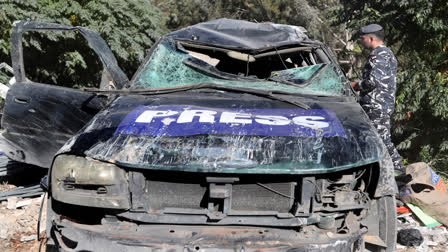Beirut:An Israeli airstrike killed three journalists as they slept at a guesthouse in southeast Lebanon at dawn Friday, in one of the deadliest attacks on the media since hostilities broke out across the border a year ago. It was a rare airstrike on an area that had so far been spared airstrikes and has been used by the media as a base for covering the war.
The 3 am airstrike turned the site — a series of chalets nestled among trees that had been rented by various media outlets covering the war — into rubble, with cars marked “PRESS” overturned and covered in dust and debris and at least one satellite dish for live broadcasting totally destroyed. The Israeli army did not issue a warning prior to the strike and later said it was looking into it.
Mohammad Farhat, a reporter for Lebanon’s Al Jadeed TV in the south, said everyone rushed out in their sleeping clothes. “The first question we asked each other: ‘Are you alive?’”
Those killed were camera operator Ghassan Najjar and broadcast technician Mohammed Rida of the Beirut-based pan-Arab Al-Mayadeen TV, and camera operator Wissam Qassim, who worked for Al-Manar TV of Lebanon’s Hezbollah group. It came after a strike earlier in the week that hit an office belonging to Al-Mayadeen on the outskirts of Beirut’s southern suburbs. Both outlets are aligned with Hezbollah and its main backer, Iran.
The airstrike early Friday was the latest in a series of Israeli attacks against journalists covering the war in Gaza and Lebanon in the past year. Israel has not commented on what its target was in the Friday attack. But human rights groups say deliberately targeting journalists is a war crime.
“Journalists are civilians that are entitled to protection under international humanitarian law,” said Aya Majzoub, Amnesty International's deputy director for the Middle East and North Africa. “It has been especially disturbing to see Israel target civilian institutions just because of their affiliation to Hezbollah.”
The strike in the Hasbaya region drew immediate condemnation from officials, journalists and press advocacy groups. TV crews had arrived in Hasbaya, deeming it safer after Israel had ordered an evacuation order for a town further south from which they were reporting. “That is why we consider it a direct targeting, aimed at getting the journalists out of the south," said Elsy Moufarrej, coordinator for the Alternative Press Syndicate in Lebanon. “They want to prevent the journalists from covering and having a presence in the south of Lebanon.”
Lebanese Information Minister Ziad Makary said the journalists were killed while reporting on what he called Israel’s “crimes,” and noted they were among a large group of members of the media. “This is an assassination, after monitoring and tracking, with premeditation and planning, as there were 18 journalists present at the location representing seven media institutions,” he wrote in a post on X.
Struck in their sleep
Imran Khan, a senior correspondent for Al Jazeera English who was among the journalists in the Hasbaya Village Club guesthouses, said the airstrike hit at around 3:30 a.m. without warning. “These were just journalists that were sleeping in bed after long days of covering the conflict,” he posted on social media, adding that he and his team were unhurt.
Hussein Hoteit, a cameraman for Egypt’s Al-Qahira TV, said he was sleeping when he woke up to a “huge weight” as the walls and ceiling collapsed. He was miraculously saved by colleagues who managed to move the debris covering him a few minutes later. Their team's house was closest to the one housing Al-Mayadeen.
